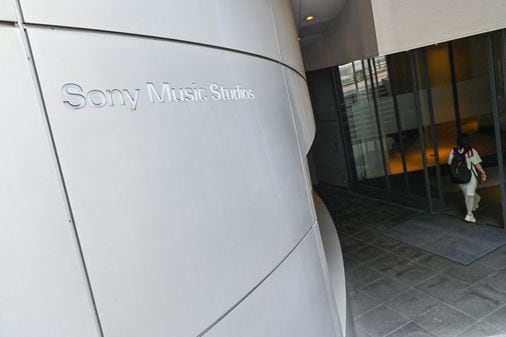The leading record companies are coming down hard on Suno, the Cambridge startup that uses artificial intelligence to let anybody compose music with a few keystrokes.
A lawsuit filed in Boston federal district court on Monday morning accuses Suno of “willful copyright infringement on an almost unimaginable scale.” The suit alleges that Suno taught its AI software to write music by training it on vast amounts of music issued by major recording labels, without getting permission from the copyright holders. A similar lawsuit was also filed Monday morning against Udio, a New York company that offers a service similar to Suno’s.
Plaintiffs in the lawsuits include recording industry giants including Universal Music Group, Capitol Records, Sony Music Entertainment, Atlantic Records and Warner Music. They’re seeking an injunction against further copyright violations, and penalties of up to $150,000 for each instance of infringement.
Mitch Glazier, chief executive of the Recording Industry Association of America, said in an emailed statement that the music industry is working with AI companies to build innovative music creation tools. But Glazier said that “unlicensed services like Suno and Udio, that claim it’s ‘fair’ to copy an artist’s life’s work and exploit it for their own profit without consent or pay, set back the promise of genuinely innovative AI for us all.”
AI services such as DALL-E generate original pictures based on a user’s description of a scene. Suno does the same thing with music. A user can request a song in any musical style, on any topic, and Suno will compose a melody, generate the lyrics and “sing” the song in a realistic computer-generated voice..
But just as DALL-E was trained using human-generated artwork, Suno is trained on music written and sung by people. The company has refused to reveal the sources of the music on which it was trained. But it has insisted that it has stayed within the boundaries of copyright law.
The recording companies disagree. “Suno’s service trains on the expressive features of these copyrighted sound recordings for the ultimate purpose of poaching the listeners, fans, and potential licensees of the sound recordings it copied,” the lawsuit says.
In an emailed statement, Suno chief executive Mikey Shulman defended his company’s practices.
“Suno’s mission is to make it possible for everyone to make music,” Shulman said. “Our technology is transformative; it is designed to generate completely new outputs, not to memorize and regurgitate pre-existing content. That is why we don’t allow user prompts that reference specific artists.”
“We would have been happy to explain this to the corporate record labels that filed this lawsuit (and in fact, we tried to do so),” added Shulman. “But instead of entertaining a good faith discussion, they’ve reverted to their old lawyer-led playbook.”
Hiawatha Bray can be reached at hiawatha.bray@globe.com. Follow him @GlobeTechLab.
var oneTrustActive = true;
var oneTrustConsentObj;
try {
oneTrustConsentObj = JSON.parse(window.localStorage.getItem(‘consent_one_trust_bgmp’) || ‘{}’);
} catch (err) {
oneTrustConsentObj = {};
}
// Default to granted consent
var consent=”grant”
// FB script decleration
!function(f,b,e,v,n,t,s) {
if(f.fbq)return;n=f.fbq=function(){n.callMethod?n.callMethod.apply(n,arguments):n.queue.push(arguments)};
if(!f._fbq)f._fbq=n;n.push=n;n.loaded=!0;n.version=’2.0′;
n.queue=[];t=b.createElement(e);t.async=!0;
t.src=v;s=b.getElementsByTagName(e)[0];
s.parentNode.insertBefore(t,s);
}
(window,document,’script’, ‘https://connect.facebook.net/en_US/fbevents.js’);
if (oneTrustActive && oneTrustConsentObj && oneTrustConsentObj.C0004 === false) {
consent=”revoke”;
}
// We need to call consent before we run init and track
fbq(‘consent’, consent);
fbq(‘set’, ‘autoConfig’, ‘false’, ‘884869448226452’);
fbq(‘set’, ‘autoConfig’, ‘false’, ‘493062270895851’);
fbq(‘init’, ‘884869448226452’);
fbq(‘track’, ‘PageView’);
